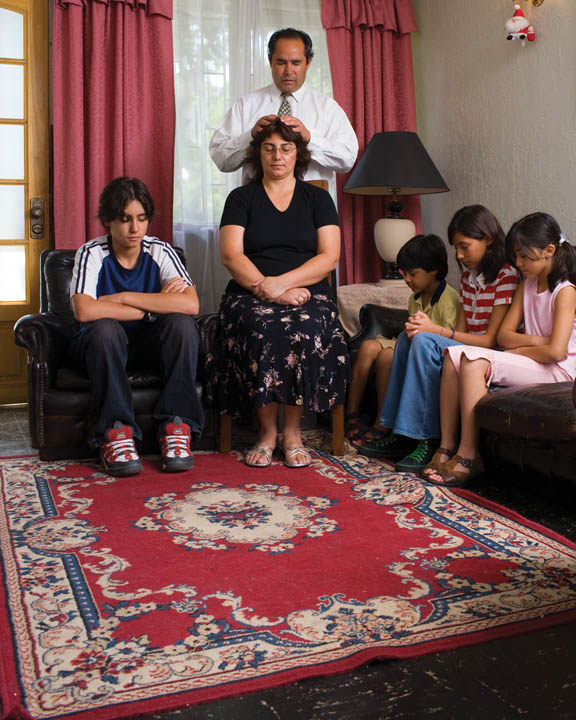In Mormonism, mothers and fathers play sacred and separate roles—and they are equal ones. Mormons do believe strongly in the traditional family, but they also believe that fathers should be very involved in family, as well as in “bread-winning,” and that mothers are not to be subservient to fathers.
A Father’s Responsibility
 Fathers are to be the main providers for their families and do their best to make sure that the needs of their children and spouse are met—food on the table, warmth in the house, clothes on the back. Children need this stability to function normally, and parents need it, too. But fathers are more than providers, and families that are very well off can suffer greatly if the father does nothing but work.
Fathers are to be the main providers for their families and do their best to make sure that the needs of their children and spouse are met—food on the table, warmth in the house, clothes on the back. Children need this stability to function normally, and parents need it, too. But fathers are more than providers, and families that are very well off can suffer greatly if the father does nothing but work.
The father needs to be involved. He needs to show his children affection and spend time with them. He needs to be a protector, spiritually and emotionally. Children should be able to come to him with their doubts and fears. And his discipline should be both consistent and kind. It should not be meted out in anger or dismissal.
To be actively involved in religion is also helpful. This is the conclusion of research and Mormon belief. Church is an opportunity to spend time with children, form a common interest, and create and strengthen bonds through faith.
Fathers shouldn’t leave the emotional realm and empathy of nurturing to mothers. They should also be aware of when children are upset and sad and be willing to attend to them.
Also, in the spirit of empathy and common interest, fathers should plan activities with their children that they’ll both enjoy, be it swimming, watching a movie, or fixing a bike.
A Mother’s Responsibility
 Mormons believe that a mother’s central focus should be the home, with the nurturing of her children paramount. The home is a place that is often devalued. Because motherhood doesn’t come with set hours, set tasks, and a paycheck, it’s often seen as the very lowest of labor. Mothers may get discouraged. They may wonder if the family wouldn’t do better with both parents working. However, research shows that children left with other caretakers do not do as well emotionally. The early years are years in which children need their mothers, particularly, for development, for love, and for support. These are essential bonds.
Mormons believe that a mother’s central focus should be the home, with the nurturing of her children paramount. The home is a place that is often devalued. Because motherhood doesn’t come with set hours, set tasks, and a paycheck, it’s often seen as the very lowest of labor. Mothers may get discouraged. They may wonder if the family wouldn’t do better with both parents working. However, research shows that children left with other caretakers do not do as well emotionally. The early years are years in which children need their mothers, particularly, for development, for love, and for support. These are essential bonds.
Mothers are to teach and guide their children, learn about their individual needs and interests, and assist them in accomplishing what they need to accomplish. They are to discuss troubles with their children and let them let out their worries and anxieties. And although the world doesn’t think motherhood is worth much, it can be truly exhausting. Mothers need a support system beyond their family and may find it helpful to join a mother’s group or have times when they can go out with friends and family.
Mothers can avoid burnout by being realistic about their expectations. Everything is not going to go perfectly. Children may tantrum, the floor might not get clean, emergencies will arise. What childcare experts suggest for your children may not work. Find what’s best for you and your children and take some time for yourself.
Read more on this topic at our sources: The Sacred Responsibility of Fathers, The Sacred Responsibility of Mothers
